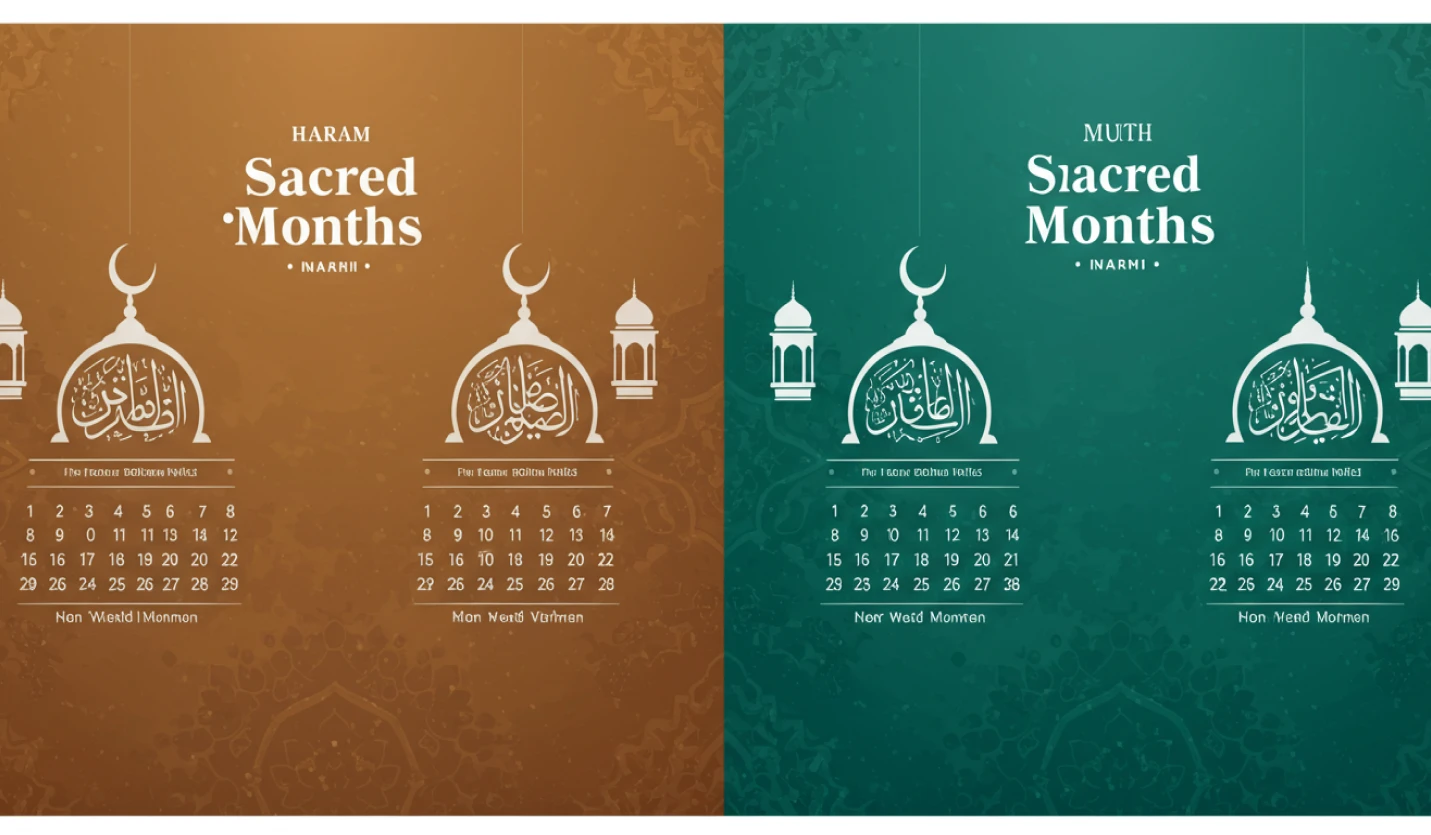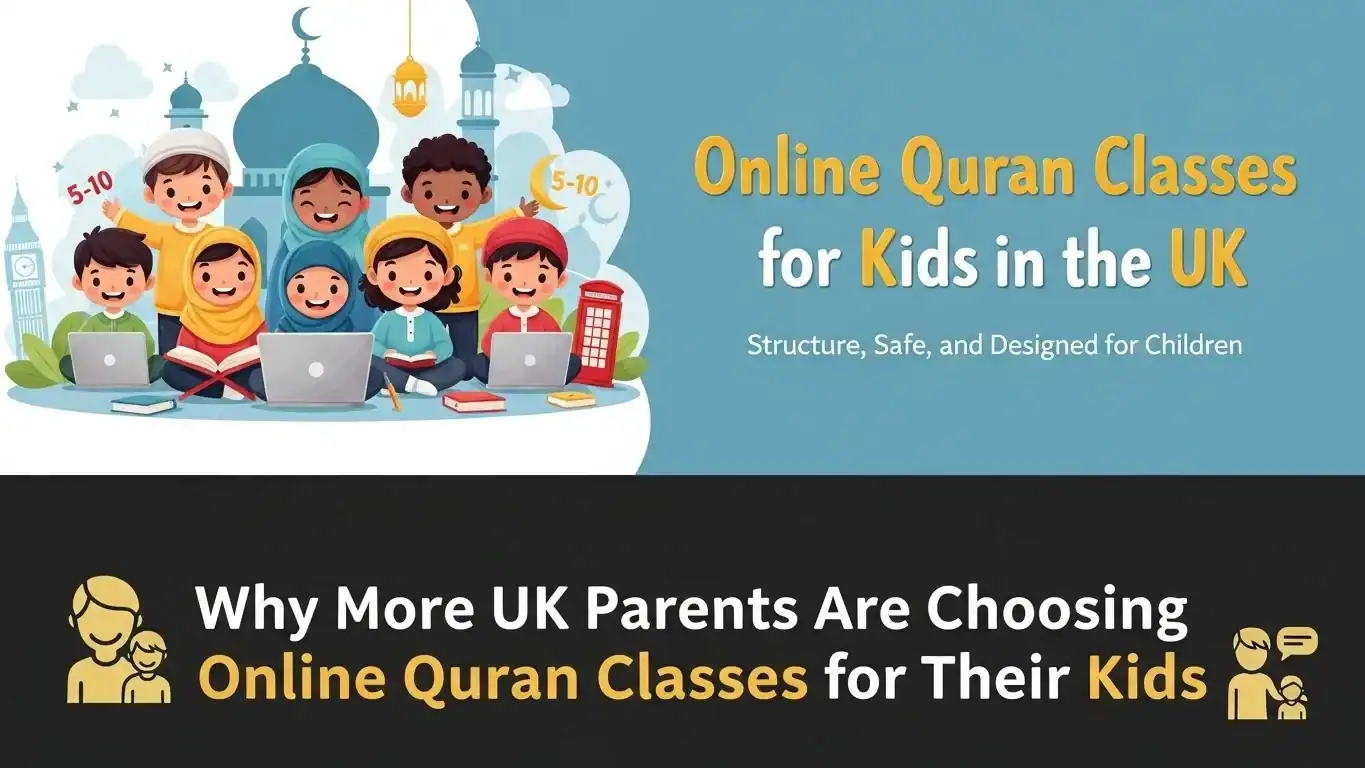The 4 Sacred Months in Islam are seasons of peace, reflection, and spiritual growth – they are divine seasons of peace, reflection, and spiritual growth.
Understanding these holy months helps Muslim children and new learners build a deeper connection with Islamic values.
Let’s explore what the four sacred months are, why they were chosen, and how to honour them today.
What Are the 4 Sacred Months in Islam?
The four sacred months in Islam are:
- Muharram
- Rajab
- Dhul-Qi’dah
- Dhul-Hijjah
These months were declared sacred by Allah in the Quran and honoured by Prophet Muhammad ﷺ.
They are mentioned in Surah At-Tawbah (9:36), where Allah says:
“Indeed, the number of months with Allah is twelve… of them four are sacred.
That is the correct religion…”
Why Are These Months Called Sacred?
The sacred months in Islam are special because Allah gave them extra weight. Sins committed during these months are more serious — and good deeds are even more rewarded.
- Fighting and warfare were prohibited during these months
- Muslims are encouraged to increase worship, charity, and self-reflection
- It’s a time to reconnect with Allah and seek forgiveness
Learning about the holy months in Islam helps kids understand that Islam teaches peace — not just through words, but through time itself.
A Quick Overview of the Four Sacred Months in Islam
Let’s look at each sacred month and what makes it special:
Muharram – The Month of Allah
- First month of the Islamic calendar
- Known for Ashura (10th Muharram), a day of fasting and reflection
- One of the most virtuous months after Ramadan
- A great time for charity, dua, and peaceful intentions
Rajab – Gateway to Ramadan
- Seventh month in the Islamic calendar
- Marks the start of the “spiritual season” leading to Ramadan
- Isra and Mi’raj (Night Journey) happened in Rajab
- Recommended to increase prayers and fasting
Dhul-Qi’dah – Month of Truce
- 11th month of the Islamic calendar
- Historically, fighting was forbidden during this month
- A sacred time to prepare for Hajj and reflect on your intentions
- A time to focus on peace, wisdom, and patience
Dhul-Hijjah – Month of Hajj and Sacrifice
- 12th and final month of the Islamic calendar
- Contains the 10 best days of the year
- Includes Hajj pilgrimage, Eid Al-Adha, and the Day of Arafah
- Full of reward and opportunities for reflection and gratitude
Have questions?
Chat with us directly on WhatsApp
Virtues of the Sacred Months in Islam
Understanding the virtues of the four sacred months helps build spiritual awareness in both children and adults.
- Encourages deeper worship and accountability
- Teaches the value of peace and non-violence
- Enhances connection to the Seerah of the Prophet ﷺ
- Helps learners appreciate Islamic history and timekeeping
Want your child to explore these virtues in depth? Our Islamic Studies course brings these values to life in engaging, age-appropriate ways.
Teaching Children About the Sacred Months
Many parents ask: How do I explain these months to my kids in a simple way?
Here’s how:
- Use Islamic calendars with visual markers for the sacred months
- Share short stories from Seerah related to each month
- Encourage small actions (charity, extra prayer, kind words)
- Reward good behaviour during these months to make them memorable
Teaching children about the four holy months in Islam helps them connect emotionally and spiritually to their faith — far beyond rituals.
Why Learning About Sacred Months Matters in Modern Times
Even in today’s fast world, the 4 blessed months in Islam give us spiritual breathing space.
- A break from distractions to refocus on your values
- A chance to slow down and reassess life’s direction
- Opportunities to teach children mindfulness and inner peace
- A reminder that time in Islam is sacred and structured for growth
Many students who study Islamic sacred months through structured courses say it transforms how they experience the Islamic year.
Learn the Sacred Months Through Our Islamic Studies Course
At Quranic Mind we help learners of all ages — especially children and new Muslims — explore the meaning behind sacred Islamic teachings.
📚 In our Islamic Studies course students will:
- Learn about all Islamic months and their spiritual importance
- Understand the four sacred months in Islam through stories and real-life examples
- Connect Quranic verses to Islamic history
- Explore practical applications of values like peace, gratitude, and worship
Looking for a structured way to grow in your deen?
👉Want to explore more? Browse all our Quran and Islamic courses here – 2 Free Trial Lessons Available.
Why Choose Quranic Mind academy?
We don’t just teach facts — we teach values.
At Quranic Mind our goal is to build well-rounded, spiritually aware students.
🎓 Why families in the UK and beyond choose us:
- Azhar-certified teachers with native Arabic fluency
- Personalised 1-on-1 sessions for children and adults
- Friendly, engaging methods with storytelling and interaction
- Flexible schedules and progress reports for parents
- Trusted by families across the UK, US, and beyond
📢 Start your journey in understanding Islam — not just practicing it.
Have questions?
Chat with us directly on WhatsApp
Frequently Asked Questions (FAQ)
What are the 4 sacred months in Islam?
They are Muharram, Rajab, Dhul-Qi’dah, and Dhul-Hijjah. These were declared sacred by Allah and respected by the Prophet ﷺ.
Why are these months considered sacred?
They are months in which fighting is forbidden and good deeds are more heavily rewarded. They encourage peace, patience, and reflection.
Are there special acts of worship during the sacred months?
Yes — such as fasting, extra prayer, dhikr, charity, and avoiding sinful behaviour. Dhul-Hijjah and Muharram in particular have special days of fasting.
How can I teach my child about the sacred months?
Use simple Islamic stories, visual calendars, and small goal-based activities like daily duas or acts of kindness. Our Islamic Studies course makes this easy.
Do all Muslims follow the same sacred months?
Yes. All Islamic schools of thought agree on the same 4 sacred months, based on the Quran and authentic Hadith.
Start Exploring the Sacred Months with Meaning
The sacred months in Islam are not just historical markers — they are living seasons of the soul.
Help your child — or yourself — experience these months with full awareness, reverence, and joy.
Get 2 Free Trial Lessons — Start Today
👉 Enroll in Our Islamic Studies course
Explore time in Islam through meaning, reflection, and faith.




